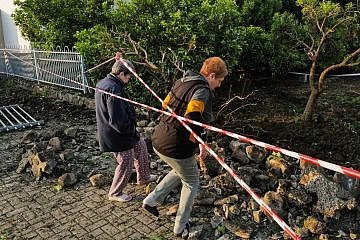“Diplomacy is the best path to de-escalate the situation,” Putin’s envoy says.
Amichai Stein
(JNS)
A few days ago, the phone rang in the office of Israeli National Security Council head Tzachi Hanegbi. “Nikolai Patrushev, the secretary of the Security Council of Russia, would like to talk with you” was the message conveyed.
The conversation, the first between senior Israeli and Russian officials since Iran’s April 14 attack on the Jewish state, was defined as “good” by sources with knowledge of the matter.
Patrushev conveyed a message from President Vladimir Putin that “diplomacy is the best path now to de-escalate the situation.”
Hanegbi responded, “The whole world must stop the Iranian aggression. This was a severe attack.”
Russia, with its close ties with Iran, joins a host of nations trying to prevent days Israel from responding in force to the Islamic Republic’s missile and drone assault.
The U.S. is leading the effort, with President Joe Biden, Secretary of State Antony Blinken, Secretary of Defense Lloyd Austin and National Security Advisor Jake Sullivan leading the message to Israel: There’s no veto, but we prefer if you won’t attack.
“Israel is going to make its own sovereign decisions,” Deputy Pentagon Press Secretary Sabrina Singh told JNS. “But we are going to have very candid conversations with the Israelis, and we continue to do so.
“What we don’t want to see, and what we continue to reiterate, both publicly and privately, is we don’t want to see this widen out to a regional conflict. We don’t want to see a wider war. We want tensions to de-escalate,” she said.
“We should all take a moment and really celebrate the success that we had over the weekend,” Singh added.
These calls are also coming from Europe.
British Foreign Secretary David Cameron said during a visit to Israel on Wednesday: “It is clear the Israelis are making a decision to act after the Iranian attack. We hope Israel acts in a way that does as little to escalate this as possible.”
‘Think of the challenges’
Jeremy Issacharoff, who served as Israel’s ambassador to Germany from 2017 to 2021, told JNS the message is probably not simply one of don’t attack but probably a more nuanced, “Just think of the challenges you’re facing in Gaza, the situation with Hezbollah and also the fact that the attack by Iran against Israel, while the scope of it was way out of line and unacceptable and intolerable, the regional defense mechanism that essentially foiled it was very effective and we need to build on this defense mechanism and this new regional spirit of mutual security.”
Sources with knowledge of the conversation between senior Israeli officials and Cameron and German Foreign Minister Annalena Baerbock, who also visited the Jewish state on Wednesday, told JNS there was a request from the Europeans “to think from the head and not the gut.”
Israel’s Kan News reported that a decision has already been made regarding the nature of Israel’s response to the Iranian attack. Still, officials who spoke to JNS said that there is a chance that the international pressure might bring changes.
The White House announced on Wednesday that it will increase the sanctions on Iran’s drone and ballistic missile industry and try to convince the other G7 countries to do the same.
Minister-without-Portfolio Benny Gantz, a member of Israel’s War Cabinet, and other officials told Cameron and Baerbock that Jerusalem “expects the world to add more military and economic sanctions on Iran.”
Issacharoff told JNS, “I think it could spur the Western powers to take much more serious steps against Iran at this point regarding the nuclear program.
“Nothing has been done in the international community against Iran’s nuclear program, which is at the most advanced stage it has ever been with higher levels of [uranium] enrichment and making them a threshold state.
“There is a combination of interests here that could serve Israel’s interest and could very much serve the Western interest as well in terms of modifying or preventing escalation with Iran and also beginning to find a reasonable solution to the nuclear program,” Issacharoff said.
Prime Minister Benjamin Netanyahu said Wednesday, “We thank our allies for all their advice, but the final decision will be made by us.”
Amichai Stein is the diplomatic correspondent for Kan 11, IPBC.
Image: Israelis check the damage to their home from the previous night’s Iranian missile attack in Katzrin, the Golan Heights, April 14, 2024. Photo by Michael Giladi/ Flash90.



